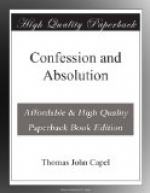Text: “God hath reconciled us to Himself by Christ, and hath given to us the ministry of reconciliation. For God indeed was in Christ, reconciling the world to Himself, and He hath placed in us the word of reconciliation; we are therefore ambassadors for Christ.”—2 Cor. v, 18.
No more important question can be submitted for consideration to those who believe in the existence of God, in man’s responsibility to his Creator, and in divine revelation, than what are God’s conditions for pardoning sin committed after baptism. For however much men may doubt, deny, or dispute about religion, they can never impugn the fact that they are individually sinners. “If we say we have no sin, we deceive ourselves, and the truth is not in us;"[1] “in many things we all offend;"[2] even “the just man shall offend seven times."[3]
Good sense, as well as faith, tells us that having willingly committed or consented to any thought, word, or deed prohibited by God, or having knowingly and wilfully omitted any duty imposed by the divine law, then have we revolted against our God. And should this be done with full knowledge and deliberation in a matter deemed grave by the Lawgiver, or grave in its own nature, or rendered so by circumstances, then has there been a grievous transgression of our duty to God.
The moment we so act, are we and our crime abominable in the sight of the All Holy. “Thou hatest all the workers of iniquity;"[4] and to the Lord “the wicked and his wickedness are hateful alike."[5] Our sin instantly merits eternal punishment: “If the just man turns himself away from his justice, and do iniquity according to all the abominations which the wicked man useth to work, shall he live? All his justices which he had done shall not be remembered."[6] “But the fearful, and unbelieving, and the abominable, and murderers, and whoremongers, and sorcerers, and idolaters, and all liars, they shall have their portion in the pool burning with fire and brimstone, which is the second death."[7] Finally, by our grievous sin do we destroy habitual or justifying grace, the supernatural life of the soul, rendering it incapable of doing aught that will have everlasting reward. “When concupiscence hath conceived, it bringeth forth sin; but sin, when it is completed, begetteth death."[8] Well, therefore, are we told: “Flee from sins as from the face of a serpent; for if thou comest near them, they will take hold of thee; the teeth thereof are the teeth of a lion, killing the souls of men."[9]
Deadly sin accordingly puts us at enmity with God, and deprives us of all claim on His justice. These are days when men talk much of their own rights. Little do they think to assert and uphold the rights of the King of Kings, the Lord of Lords. And so it escapes them that having violated their obligations to their Creator, their Redeemer, their Sanctifier, by grievous sin, they have no claim for pardon on




